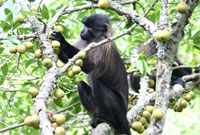The advantages of a spatial memory – Mangabey monkeys are less efficient in finding food when they enter a new area
Studying the ability of primates to find food during times when they are exploring new areas can provide important insights into the adaptive value of long-term spatial memory. Researchers Karline Janmaat of the Max Planck Institute for Evolutionary Anthropology in Leipzig, Germany, and Rebecca Chancellor of the University of California in Davis, USA, investigated the ranging of a group of mangabey monkeys that had been studied for 6 years in Kibale National Park, Uganda. During their studies the group started exploring a new area and being unfamiliar with the location of their favorite fig trees and places to forage and travel on the ground, the monkeys travelled longer distances per day in the new compared to the old area. The research strongly suggests that when primates move into an area in which they have no experience, their lack of long-term spatial memory of that area can decrease their efficiency in finding food (International Journal of Primatology, September 14, 2010).
